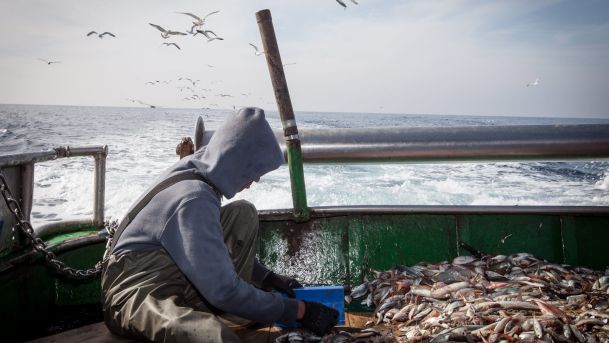ISRAEL TO LIMIT FISHING IN MEDITERRANEAN IN RESPONSE TO DECLINING FISH STOCKS

Author: Zafrir Rinat
Photo: www.haaretz.com
Restrictions will soon be imposed on commercial fishing in the Mediterranean Sea in order to stem the decline in fish populations, the state promised the High Court of Justice this month.
Certain fishing activities will be halted completely, while others will be restricted in their duration. A representative of Israeli fishermen and an expert in the field both argue that some of the restrictions are not based on science and will cause unnecessary harm to the fishermen’s livelihoods.
The state specified the measures in its response to a petition filed by the Society for the Protection of Nature in Israel against the Agriculture Ministry and its fisheries department. In its petition, the environmental advocacy organization argued that the state is lax in taking measures to stop overfishing. The Israel Nature and Parks Authority joined SPNI’s demands outlined in the petition.
In an oral response to the court this month, the state said it would impose restrictions as permitted by existing regulations within a few days and would move to issue additional restrictions in about a month, after submitting them to fishermen for comments.
Among other limitations, the state will restrict fishing by divers during the May-June spawning season along the Mediterranean coast. The use of trawlers – boats that drag large nets along the sea bed, sweeping up everything in their path – will be prohibited from June to August near the shore and at depths of less than 30 meters. The state said it plans to impose restrictions in the future also in rocky areas with particularly diverse populations of marine creatures.
According to environmental advocacy organizations, the two dozen or so trawlers operating along the Mediterranean coast are responsible for the decline in fish populations, both because they account for around 70 percent of the catch by Israeli fishermen in the sea and because of the nets’ deleterious effect on marine habitats.
Reacting to the state’s announcement, SPNI said the specified measures were inadequate. The organization said dragnet fishing must be prohibited in water shallower than 40 meters, not 30 meters as proposed by the state, year-round, adding that this is the only way to protect young fish and rock reefs. The INPA agrees that trawlers cause heavy damage and must be restricted, especially in shallow water.
But Uri Sharon, a spokesman for the fishermen who owns a trawler, claims that the proposed restrictions will not significantly increase fish populations because the trawlers are not to blame for the reduction of fish stocks. He accused SPNI of waging a public campaign that ignored the real facts. According to Sharon, the real culprits are pollution and the Aswan Dam, which reduced the amounts of food sources and marine life reaching the Mediterranean from the Nile River.
Menakhem Ben-Yami, an expert on Israel’s fishing industry, also rejected SPNI’s arguments regarding the damage caused by trawlers. In an opinion paper, he noted that trawling activity along Israel’s Mediterranean coast has remained stable for many years, and that because of the high costs of operation trawler owners suspend fishing when catch levels decline. At the same time, Ben-Yami argued, tens of thousands of amateur fishermen use nets and poles, without facing any catch restrictions.




